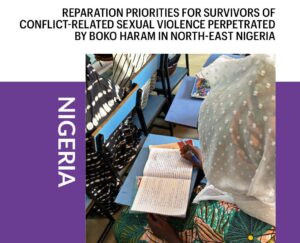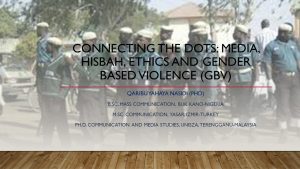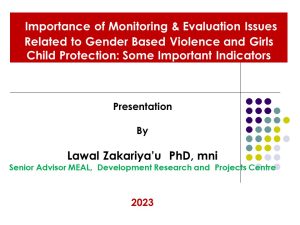
Conflict-related Sexual Violence and Gender-Based Violence Prevention
For more than two decades, the development Research and Projects Centre (dRPC) has been at the forefront of efforts to address CRSV & GBV in Nigeria. Our work combines rigorous research with practical interventions, with a special focus on conflict-related sexual violence (CRSV) and faith-based approaches to prevention of GBV. Over the years, our initiatives have received support from international development partners, including the Ford Foundation, the Global Survivors Fund, and York University through a Social Sciences and Humanities Research Council (SSHRC) – funded Partnership Grant.
Between 2015 and 2020, dRPC served as Nigeria’s national partner in the Conjugal Slavery in War (CSiW) project—a global research collaboration spanning four universities, six community-based organisations, ten countries, and twenty collaborators. Funded by York University, the project examined forced marriage in conflict settings, trained both community-based and academic researchers, and developed innovative public education materials to influence policy at local, national, and international levels.
Read More
Our role in Nigeria focused on understanding the abduction and forced marriage of women and girls by Boko Haram during the North-East crisis. We conducted in-depth qualitative research with survivors, both male and female, and created a clearinghouse of existing documentation and NGO reports on femininities and masculinities. This work produced two major knowledge products: the Nigeria Country Report – https://csiw-ectg.org/wp-content/uploads/2019/10/Nigeria-Report.pdf, which captured survivors’ journeys from abduction and captivity to reintegration, and the Justice Survey Report – https://csiw-ectg.org/wp-content/uploads/2021/03/Nigeria-Justice-Survey-Report-March.18.2021-Final.pdf, which explored how communities and institutions perceive justice for SGBV crimes and identified pathways for stronger legal and social support systems.
In 2021, the dRPC, with funding from the Ford Foundation and in collaboration with the Global Survivors Fund (GSF) and the Conjugal Slavery in War (CSiW) Partnership, worked to elevate the importance of survivors’ agency and voices. Together with grassroots organizations from 12 African countries—Democratic Republic of Congo, Central African Republic, Chad, Guinea, Kenya, Liberia, Mali, Nigeria, Rwanda, Sierra Leone, South Sudan, and Uganda—and the panel supporting the Democratic Republic of Congo’s presidency at the African Union, they organized a Survivor Hearing on Reparations. The hearing provided a dedicated platform for survivors of Conflict-Related Sexual Violence (CRSV) to share their testimonies, perspectives, and reflections on reparations, with a strong emphasis on participation and the co-creation of survivor-centered reparation programs.
Four key activities were conducted: a) Pre-hearing Consultations with the Survivors of Conflict-related Sexual Violence; b) Kinshasa Survivors’ Hearing on Reparation; c) Post Hearing Validation Meetings and d) Finalization of the Kinshasa Declaration.
The Kinshasa Declaration on the Right to Reparation and Co-Creation by Survivors and Victims of Conflict-Related Sexual and Gender-Based Violence was developed from the Kinshasa Principles, which survivors articulated during the Survivors’ Hearing on Reparations held in November 2021 in Kinshasa, Democratic Republic of Congo.
The Kinshasa Declaration was launched at a side event of the African Commission on Human and People’s Rights’ 73rd session in Banjul in October 2022, cohosted by GSF and REDRESS, and moderated and led by survivors who had participated in the declaration development process. The survivor-led format was successful and is now referred to with partners as the “Banjul model”. During this event, commissioners, survivors, and other participants discussed the importance of effective reparation for survivors across Africa and the need to adopt a process of co-creation throughout the development and implementation of reparations programs – https://www.ohchr.org/sites/default/files/documents/issues/torture/sr/cfis/cfi-ga79/subm-identifying-documenting-investigating-cso-global-survivors-fund-annex.pdf.
Building on this experience, dRPC implemented the Global Reparations Study (GRS) in Nigeria between October 2023 and December 2024, with funding from the Global Survivors Fund. This national study sought to amplify survivors’ voices and document their perspectives on reparations—individual, collective, and interim. It aimed to increase awareness of the right to reparation, deepen understanding of survivors’ needs, and lay the groundwork for survivor-centred reparations programmes. The findings, compiled in the Nigeria Reparations Study Report, are set for dissemination in 2025.
Our work also recognizes the crucial role of religious leadership in shaping social norms. Through the Transforming Muslim Opinion Leaders (MOLs) as Champions for GBV Prevention and Response in Northern Nigeria project, funded by the Ford Foundation, we are equipping influential Muslim leaders with the knowledge and tools to challenge harmful practices and promote gender equality from within the framework of Islamic teachings. The project, designed to address the increasing rates of GBV identified by the dRPC in a 2023 baseline study, builds upon 20 years of dRPC’s work engaging MOLs, strengthening and positioning them to communicate, advocate for, and model change to prevent GBV. Over two years, twenty-four leaders from Jigawa, Kano, Kaduna, and Zamfara States are participating in peer-learning exchanges, study tours, and community outreach, with the goal of influencing policy, strengthening Sharia bureaucracy engagement, and ensuring GBV prevention measures are culturally resonant and sustainable.
This work has already recorded a major achievement. In November 2024, dRPC hosted a sensitization seminar for Sharia Court judges from Kano and Kaduna on preventing harm to women and girls. The discussions prompted the Grand Khadi of Kano State to issue a new Practice Direction in February 2025, reforming how Sharia Courts handle cases of physical or verbal maltreatment in marriage. Under the new guidance, such cases can no longer be summarily dismissed due to lack of witnesses, removing a significant barrier to justice for women in private marital disputes.
Another significant achievement is the message that is spread by Muslim Scholars sensitized by the MOLs in March 2025. The Muslim Scholars are using their platforms to cascade the messages to their followers across various mosques and platforms:
- Sheikh Marooph Raji, during a Tafsir session at the NAFSAT Headquarters Mosque in Abuja on March 3, 2025, spoke extensively on the status of women in Islam. He emphasized the respect and rights granted to women in Islam, stressing the importance of upholding these values in everyday life (https://youtu.be/TlE_ToFwusc?si=KSmFyM46oKTS2QK2) .
- In a virtual Ramadan session on March 14, 2025, another MOL, Sheikh Abdussalam Abubakar Baban Gwale, addressed the sensitive topic of Female Genital Mutilation (FGM). He clarified that while FGM is not commonly practiced in Northern Nigeria, it is prohibited (haram) in Islam wherever it occurs—debunking harmful misconceptions that may persist in some communities.
- Sheikh Tahir Baba, Chief Imam of Mairago Mosque in Unguwar Kyauta, Kaduna, in two Tafsir sessions held on March 3 and 26, 2025, urged men to fulfill their responsibilities toward their families as prescribed by Islamic teachings. He warned that the growing prevalence of violence and neglect within families is contributing to societal breakdown and moral decay—outcomes that run counter to the values of Islam.
- Imam Sani Umar of Takai Mosque, Takai Local Government Area, Kano, delivered a strong message during his Tafsir session on March 3, 2025, emphasizing that Islam condemns all forms of Gender-Based Violence (GBV). He noted that the punishment for rape in Islam is death, not imprisonment—underscoring the severity of the offense and Islam’s strong stance on protecting human dignity.
- Muhammad Rabiu Saad, the Chief of Bayero University Kano (New Site), delivered a sermon on the need for the Muslim Umma to do more in protecting their girl child from abuses. He cautioned against giving tasks that will endanger their lives. The sermon was delivered on 18th July 2025.
Between 2022 and 2024, the development Research and Projects Centre (dRPC) with the support of ALIGN (Advancing Learning and Innovation on Gender Norms) platform, conducted an in-depth study titled “Gender Norms, Media Narratives and Women in Appointive Positions in Nigeria.” This research explored how deep-rooted societal gender norms influence media portrayals of women serving in appointed, non-elective public roles. Using a combination of comparative media content analysis at the national level and in-depth interviews with female appointees and their colleagues across five Nigerian states, the study unearthed how the media frequently frames these women as weak, incompetent, or lacking credibility contrasting sharply with the more neutral tone adopted for their male counterparts.
Beyond surface-level disparities, the study highlighted regional nuances: in Northern Nigeria, traditional cultural and religious norms compel women to rely on male networks to access leadership roles, whereas in Southern states, women more often leverage confidence and societal institutions to navigate public office. Across both regions, pervasive structural and cultural biases including gendered harassment, heightened scrutiny, and discriminatory expectations by male superiors pose significant barriers to the acceptance and progress of female appointees.
As a result of this research, one of the key recommendations led to the EmpowerHer Media Initiative, which secured funding from USAID in 2024 as part of the strategy to address the findings. This initiative was designed to counter biased media narratives, promote positive portrayals of women in appointive positions, and strengthen public support for women’s leadership in Nigeria.
The organization is also co-leading a multicountry research initiative, titled “Political Parties’ Responses to Technology-Facilitated Gender-Based Violence (TF-GBV)”, under the ALIGN (Advancing Learning and Innovation on Gender Norms) platform, funded by the Overseas Development Institute (ODI). Launched in November 2024, this project investigates how social and gender norms influence political parties’ reactions to the growing threat of online gender-based violence—such as harassment, cyberstalking, doxxing, and other forms of digital abuse—targeting women in elective position. It employs a mixed-methods approach, including interviews, policy reviews, and digital data analysis. In Brazil, Data-Pop Alliance leads the implementation, while in Nigeria, dRPC spearheads the research, ensuring both country-specific insights and opportunities for cross-country learning.
At its core, the initiative aims to generate evidence-based recommendations that help political parties, digital platforms, and regulatory frameworks evolve toward safer and more inclusive political spaces for women. Preliminary findings in Nigeria reveal that most political parties lack internal mechanisms to handle TF-GBV, and many women hesitate to report incidents due to stigma or fear of political repercussions. This research illuminates these gaps.
CRSV & GBV Prevention Project Portfolio
Muslim Opinion Leaders for GBV Prevention Project
Project Title: Muslim Opinion Leaders for GBV Prevention Project
Duration: 2024 – 2025
Funder: Ford Foundation
Brief about the Project: The Transforming Muslim Opinion Leaders (MOLs) as Champions for Gender-Based Violence (GBV) Prevention and Response in Northern Nigeria project seeks to prevent GBV by equipping MOLs with knowledge to educate communities on the correct Islamic perspective regarding GBV.
Political Parties’ Responses to Technology-Facilitated Gender-Based Violence (TF-GBV)
Project Title: Political Parties’ Responses to Technology-Facilitated Gender-Based Violence (TF-GBV)
Duration: 2024 – Ongoing
Funder: Overseas Development Institute (ODI)
Brief about the Project: This multi-country research initiative, conducted under the ALIGN (Advancing Learning and Innovation on Gender Norms) platform, investigates how social and gender norms influence political parties’ responses to the growing threat of online gender-based violence—including harassment, cyberstalking, doxxing, and other forms of digital abuse—targeting women in elective positions. Launched in November 2024, the project employs a mixed-methods approach, including interviews, policy reviews, and digital data analysis. In Brazil, the Data-Pop Alliance leads the implementation, while in Nigeria, dRPC spearheads the research to generate country-specific insights and foster cross-country learning.
EmpowerHer Media Initiative
Project Title: EmpowerHer Media Initiative
Duration: 2024
Funder: USAID
Brief about the Project: The “EmpowerHer Media Initiative” is an empowerment facing project in the critical area of media and gender in Africa implemented in 2024. This initiative was designed to counter biased media narratives, promote positive portrayals of women in appointive positions, and strengthen public support for women’s leadership in Nigeria.
Global Study on the Status of and Opportunities for Reparations for Survivors of Conflict-Related Sexual Violence in Nigeria
Project Title: Global Study on the Status of and Opportunities for Reparations for Survivors of Conflict-Related Sexual Violence in Nigeria
Duration: 2023 – 2024
Funder: Global Survivors Fund (GSF)
Brief about the Project: The Nigeria Reparations Study is a comprehensive investigation into the current landscape and opportunities for reparations for survivors of Conflict-Related Sexual Violence (CRSV) in Nigeria. The study aims to capture survivors’ experiences and contribute to the design of effective survivor-centered reparations programs and initiatives. The project was implemented by the development Research and Projects Centre (dRPC) in partnership with the Explore Humanitarian Aid Initiative (ExploreAid) and the Grassroots Researchers Association (GRA).
Gender Norms, Media Narratives, and Women in Appointive Positions in Nigeria
Project Title: Gender Norms, Media Narratives, and Women in Appointive Positions in Nigeria
Duration: 2022 – 2023
Funder: Overseas Development Institute (ODI)
Brief about the Project: Between 2022 and 2023, the development Research and Projects Centre (dRPC), in collaboration with the ALIGN platform, conducted a study examining how entrenched societal gender norms shape media portrayals of women in appointed, non-elective public roles. Using a combination of comparative national-level media content analysis and in-depth interviews with female appointees and their colleagues across five Nigerian states, the study found that women were frequently portrayed as weak, incompetent, or lacking credibility—contrasting sharply with the more neutral coverage of their male counterparts.
Conjugal Slavery in War (CSiW)
- Duration: 2015 – 2020
Funder: York University through a Social Sciences and Humanities Research Council (SSHRC) Partnership Grant
Brief about the Project: The CSiW is an interdisciplinary team of researchers and partners that examines the social and legal dimensions of conjugal slavery, or servile marriage, during times of war and its implications as a form of gender-based violence in post-conflict contexts. Through archival, qualitative, and legal research, the partnership explored the experiences of men and women who were subjected to or participated in enslavement during conflicts in the Democratic Republic of the Congo, Liberia, Nigeria, Rwanda, Sierra Leone, South Sudan, Uganda, and Mali.
MOLs for GBV Prevention Project Media Links
a) National Dialogue Conference on Gender-Based Violence (GBV)
1. https://www.osundefender.com/i-advised-my-daughters-to-retaliate-if-their-husbands-slap-them-emir-sanusi/
2. https://thesun.ng/emir-sanusi-condemns-wife-battering-says-assaulting-women-is-unislamic-uncivilized/
3. https://www.hettysmedia.com/ill-slap-you-if-your-husband-slaps-you-and-you-dont-slap-back-emir-sanusi-tells-his-daughters/
4. https://www.kanyidaily.com/2024/12/i-tell-my-daughters-to-slap-their-husbands-back-if-they-assault-them-emir-sanusi.html
5. https://kemiashefonlovehaven.com/emir-sanusi-reveals-why-he-instructed-daughter-to-slap-husband-if-he-slaps-her/
6. https://www.naijanews.com/2024/12/10/sanusi-should-not-encourage-domestic-violence-nigerians-react-to-emirs-slap-instruction-to-daughters/
7. https://thestentornews.com/2024/12/10/kano-emir-vows-to-depose-title-holders-who-beat-wives/
8. https://triumphnewspapers.ng/kano-emir-vows-to-depose-title-holders-who-beat-their-wives/
9. https://www.bbc.com/hausa/bbc_hausa_radio/w3ct77cr
10. https://www.thecapital.ng/if-your-husbands-slap-you-and-you-did-not-slap-him-back-i-will-slap-you-emir-sanusi-tells-his-daughters/
11. https://www.qed.ng/i-instructed-my-daughters-to-retaliate-if-their-husbands-ever-slap-them-emir-sanusi/
12. https://www.gistmania.com/talk/topic,610286.0.html
13. https://www.legit.ng/nigeria/1629745-why-i-told-daughters-retaliate-husbands-slap-emir-sanusi-explains/
14. https://www.legit.ng/politics/1629715-emir-sanusi-vows-depose-title-holders-reason/
15. https://guardian.ng/news/sanusi-vows-to-dethrone-wife-beaters-as-anti-gbv-war-thickens-in-north/
16. https://www.vanguardngr.com/2024/12/i-told-my-daughters-to-retaliate-if-their-husbands-slap-them-emir-sanusi/
17. https://thesourceng.com/beat-your-wife-get-deposed-emir-sanusi-warns-traditional-title-holders/
18. https://pmnewsnigeria.com/2024/12/09/i-told-my-daughters-to-slap-their-husbands-back-if-they-hit-them-emir-sanusi/
19. https://leadership.ng/emir-sanusi-advocates-retaliation-against-domestic-violence/
20. https://punchng.com/kano-emir-threatens-removal-of-title-holders-beating-wives/
21. https://thenationonlineng.net/gbv-its-forbidden-to-beat-slap-a-woman-in-islam-says-emir-sanusi/
22. https://www.vanguardngr.com/2024/12/gbv-i-told-my-daughters-to-retaliate-if-their-husbands-slap-them-emir-sanusi/
23. https://punchng.com/gbv-sanusi-ii-threatens-to-strip-titles-of-wife-beating-chiefs/
24. https://dailytrust.com/gbv-i-tell-my-daughters-to-retaliate-if-their-husbands-slap-them-emir-sanusi/
25. https://thenationonlineng.net/drpc-trains-50-sharia-court-judges-40-imams-on-gbv/
26. https://www.vanguardngr.com/2024/11/group-seeks-ties-with-sharia-judges-to-eradicate-gender-based-violence/
27. https://thesyndicate.com.ng/sharia-court-judges-must-give-protection-to-gbv-victims-lawyers/
28. https://dailytrust.com/leaders-unite-against-gender-based-violence/
29. https://gwg.ng/2024/12/10/wives-slap-shehu-sani-others-counter-emir-sanusi/
b) MOLs Advocacy Visit to Emir of Zazzau
30. http://www.dailystruggle.ng/2025/02/drpc-seeks-to-mitigate-gender-base.html
31. https://nfsnews.com/feed/emir-seeks-revisit-of-draft-muslim-personal-law-bill
32. https://aminiya.ng/cibiyar-bincike-ta-nemi-a-tabbatar-da-dokar-kare-ha%c6%99%c6%99in-mata-a-arewa/
33. https://blueprint.ng/ngo-seeks-zazzau-emirs-support-against-gender-based-violence/
34. http://www.rimawaglobalnews.com.ng/2025/02/kano-base-ngo-seeks-zazzau-emirs.html
c) MOLs Advocacy Visit to Emir of Dutse
35. https://leadership.ng/emir-of-dutse-seeks-collaboration-to-tackle-violence-against-women/
36. https://dailypost.ng/2025/07/18/islamic-leaders-must-speak-up-against-gbv-emir-of-dutse/
37. https://justicewatchnews.com/violence-against-women-emir-of-dutse-demands-collective-responsibility/
38. https://thenationonlineng.net/jigawa-traditional-leaders-pledges-support-in-fight-against-gbv/?utm_source=dlvr.it&utm_medium=facebook&sfnsn=scwspwa;
39. https://www.youtube.com/live/_6TnNNTOm3c?si=BKRjsFRWrdso8ze1
40. https://youtu.be/utP0XzPYR4I?si=sKT0-NLNCIEHsfi2
41. https://www.bbc.com/hausa/bbc_hausa_radio/w3ct7tsx
d) MOLs Press Release in commemoration of International Women’s Day
42. https://dailytrust.com/iwd-muslim-cleric-seeks-protection-of-women/
43. https://trustradio.com.ng/en/iwd-muslim-cleric-seeks-protection-of-women
44. https://dailynigerian.com/iwd-2025-islamic-scholars-call-for-protection-of-women-children-against-violence/
45. https://leadership.ng/iwd-islamic-scholars-seek-protection-of-women/
46. https://trustradio.com.ng/en/iwd-muslim-cleric-seeks-protection-of-women;
47. https://dailytrust.com/iwd-muslim-cleric-seeks-protection-of-women/
e) MOLs Interactive Session with the Honorable Commissioner of Human Services on Kaduna WEE Policy
48. 15,000 women to receive N5bn grants as 25 GBV perpetrators get death sentence in Kaduna – Vanguard News
49. Kaduna Empowers 15,000 Women with N5 Billion Grant
50. Women to Receive ₦5 Billion Grant in Kaduna as 25 GBV Offenders Sentenced to Death – Radio Nigeria Kaduna English
51. 25 Face Death Sentence For GBV Violation In Kaduna – New Telegraph
52. 25 GBV Perpetrators Sentenced to Death in Kaduna, 15,000 Women to get N5bn empowerment grants – Aluta News
53. Commissioner: 25 GBV offenders sentenced to death in Kaduna | TheCable
54. 25 GBV Offenders Sentenced To Death In Kaduna
55. 25 perpetrators of gender-based violence sentenced to death in Kaduna: Commissioner
56. Kaduna: 25 gender-based violence perpetrators sentenced to death – P.M. News
57. 25 GBV perpetrators sentenced to death in Kaduna — Commissioner – Blueprint Newspapers Limited
58. Kaduna: 25 gender-based violence perpetrators sentenced to death – Legal Nigeria
59. Kaduna convicts 25 for Gender-Based Violence – Commissioner – Newswire Law and Events
60. https://youtu.be/hQN9GzM_GcM
61. https://youtu.be/pklTdUst8JI
62. https://youtu.be/ZxvwJeNgCK4?si=wgPCBKO08aHvGXMW
f) MOLs training of government officials in Niger State on Prevention of Double Gender-Based Victimization of survivors of abduction
63. Group partners Niger govt to tackle gender-based violence
64. Fear of stigma: Rescued abducted women in Niger threaten to return to terrorists – The Nation Newspaper
65. https://www.vanguardngr.com/2025/07/group-niger-govt-ministries-train-service-providers-security-agencies-on-religious-perspective-on-gbv/
66. https://www.thisdaylive.com/2025/07/29/niger-trains-staff-security-agencies-others-on-tackling-gbv-stigmatisation-through-religious-perspective/
67. https://dailynigerian.com/gbv-group-partners-niger-govt-to-train-service-providers-security-agencies-on-tackling-stigmatisation/
68. https://nigeriadailypost.com.ng/2025/07/30/fomwan-drpc-partner-to-provide-psychosocial-support-to-abducted-rescue-survivors-in-niger-state/
69. https://dailytrust.com/police-reunite-35-kidnap-victims-with-families-in-niger/
70. https://nannews.ng/2025/07/31/abduction-muslim-women-group-to-provide-psychosocial-support-to-victims/
g) Sensitization of Sharia Court Judges on Islamic Perspective on GBV
71. Shari’a Court Judges Meet On Access To Justice For GBV Survivors
72. http://ggreporters.blogspot.com/2025/06/gbv-sharia-court-judges-in-kano-and.html
73. https://www.vanguardngr.com/2025/06/kaduna-kano-sharia-court-judges-meet-to-tackle-gbv-ease-access-to-justice-for-survivors/
74. https://tribuneonlineng.com/gbv-sharia-court-judges-from-kano-kaduna-meet-to-ease-justice-for-survivors/
75. https://alutanews.ng/2025/06/14/gbv-sharia-court-judges-in-kano-kaduna-meet-to-strengthen-access-to-justice-for-survivors/
76. https://www.facebook.com/share/p/19U3ujwwhv/
77. https://leadership.ng/sharia-court-judges-meet-on-access-to-justice-for-gbv-survivors/
h) 2nd Sensitization Meeting on Gender-Based Violence (GBV) Prevention from an Islamic Perspective for Jumaat Imams from the 44 LGAs in Kano State
78. https://www.facebook.com/AfricaIndependentTelevision/videos/gender-based-violence-kano-imams-engage-on-islamic-perspective/2029301084221817/
79. https://dailytrust.com/kaduna-kano-imams-trained-on-islamic-perspectives-for-preventing-gbv/
i) Joint Session with Sharia Court Judges on GBV Adjudication
80. https://dailytrust.com/sharia-court-judges-take-steps-to-address-gbv-in-kano-kaduna/
81. https://tribuneonlineng.com/gbv-sharia-court-judges-from-kano-kaduna-meet-to-ease-justice-for-survivors/
82. https://leadership.ng/sharia-court-judges-meet-on-access-to-justice-for-gbv-survivors/
j) Advocacy Visit to Emir of Kano
83. https://www.facebook.com/groups/682481722264634/posts/2165426813970110/
84. https://dailytrust.com/emir-sanusi-calls-for-stiffer-punishment-for-men-beating-wives/
85. https://guardian.ng/news/emir-sanusi-considers-reintroducing-family-laws-to-curb-gender-based-violence/
86. https://www.vanguardngr.com/2025/07/emir-sanusi-wants-harsher-punishment-for-wife-beaters/
87. https://x.com/prnigeria/status/1947340185991090472
88. https://trustradio.com.ng/en/emir-sanusi-calls-for-stiffer-punishment-for-men-beating-wives
89. https://grassrootsparrot.com/emir-sanusi-decries-rising-wife-beating-calls-for-stiffer-punishment/
90. https://headlines.ng/emir-sanusi-calls-for-stiffer-punishment-for-men-beating-wives/
91. https://www.nigerianeye.com/2025/07/emir-of-kano-calls-for-harsher.html
92. https://leadership.ng/emir-sanusi-seeks-stiffer-punishment-for-wife-beaters/
93. https://thetrumpet.ng/emir-sanusi-advocates-for-stiffer-punishment-against-gbv/
94. https://www.nigeria.shafaqna.com/EN/AL/7476367
k) Training of CICID on M&E and Mentoring
95. https://www.youtube.com/watch?v=utP0XzPYR4I
96. https://www.facebook.com/AfricaIndependentTelevision/videos/muslim-leaders-recruited-in-fight-against-gender-based-violence/1392655465159170/



